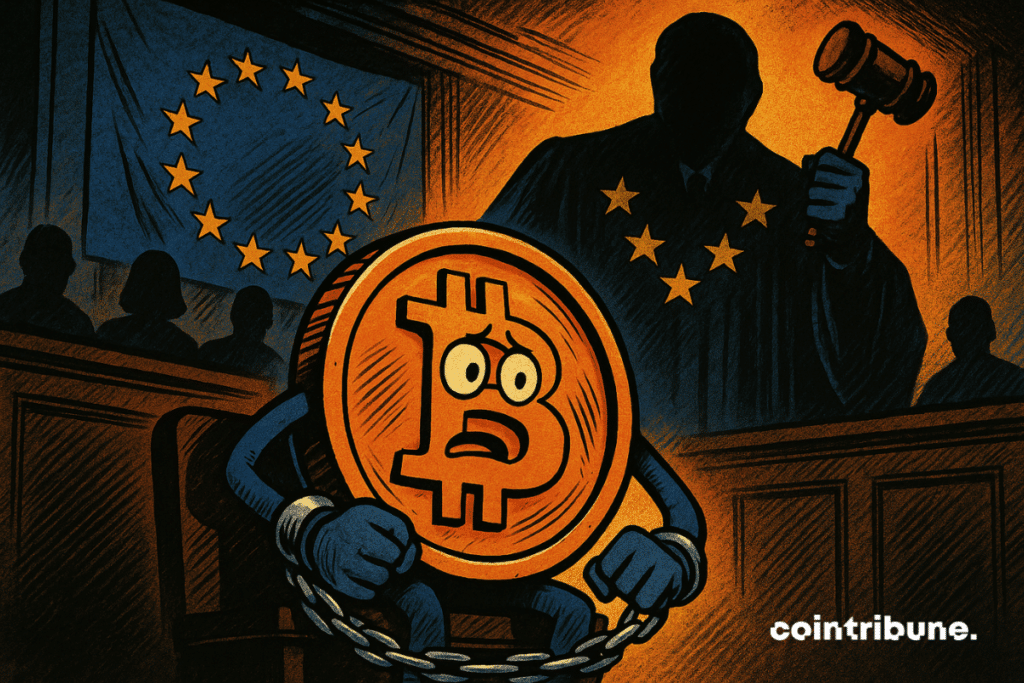Europe Eyes Bitcoin Ban—Is Crypto’s Future in Jeopardy?
Rumors swirl as EU regulators sharpen their knives—could Bitcoin be next on the chopping block? Behind closed doors, bureaucrats whisper about energy concerns and financial stability risks. Never mind that traditional banking burns through more electricity than some small nations.
The real question: Is this about protection or protectionism? Banks have been lobbying against crypto since Satoshi’s whitepaper dropped. Meanwhile, institutional investors keep stacking sats like there’s no tomorrow.
One thing’s certain: If Europe bans Bitcoin, the black market will mint new crypto millionaires overnight. Because nothing thrills financiers like creating the very volatility they claim to fear.

In Brief
- The European Data Protection Board equates Bitcoin public keys with personal data, subjecting every transaction to GDPR obligations.
- The impossibility of erasing data on the blockchain directly conflicts with the right to be forgotten required by the GDPR.
- Without legal adaptation, bitcoin could become illegal de facto in Europe, despite the absence of a formal ban.
An EDPB Decision with Feared Consequences for Bitcoin
The EDPB ruled that a public key is personal data if it can identify, even indirectly, a natural person. This definition subjects every Bitcoin address to data protection obligations. In practice, every transaction is constrained by European law.
Next, the committee asserts that technical impossibility cannot be invoked to justify non-compliance with the GDPR. Thus, Bitcoin’s immutability cannot excuse the absence of the right to erasure. The GDPR requires data deletion, but the chain does not offer it.
BTCUSDT chart by TradingViewFinally, the guidelines hypothetically mention the need to erase data, even if it requires radical measures. Some commentators interpret this as the possibility, lacking a technical solution, of having to make bitcoin inaccessible or even consider its deletion.
This hypothesis illustrates the paradox between European legal requirements and the very nature of bitcoin.
Alexandre Stachtchenko’s Warning and the Risk of De Facto Ban
Alexandre Stachtchenko sounds the alarm. According to him:
If the European Data Protection Board’s guidelines are confirmed in their final version, there will no longer be any use of Bitcoin 100% compliant with European law.
For the expert, this situation is equivalent to a de facto ban on bitcoin, without prohibition, caused by regulatory collision. He points out the absurdity of a framework where technology (immutable blockchain) clashes with law (right to erasure).
Stachtchenko then details the practical constraints:
Under the Regulation on Financial Transfers (TFR 2023/1113), mixers and “privacy” wallets are considered high risk, with KYC required from €1,000. The AMLR (2024/1624) prohibits any solution promoting anonymity.
At the national level, the French law of March 20, 2025 presumes any anonymous transaction as money laundering.
This double injunction — comply with the GDPR or face anti-money laundering sanctions — traps the user in a deadlock. Without a legal way out, bitcoinrisks becoming de facto illegal in Europe.
The EDPB public consultation remains open until June 9, 2025. It is crucial that Bitcoin ecosystem actors, Web3 companies, and policymakers actively participate in this consultation. Without legal framework adaptation, the very use of bitcoin — and more broadly public blockchains — could become incompatible with European law.
Maximize your Cointribune experience with our "Read to Earn" program! For every article you read, earn points and access exclusive rewards. Sign up now and start earning benefits.

